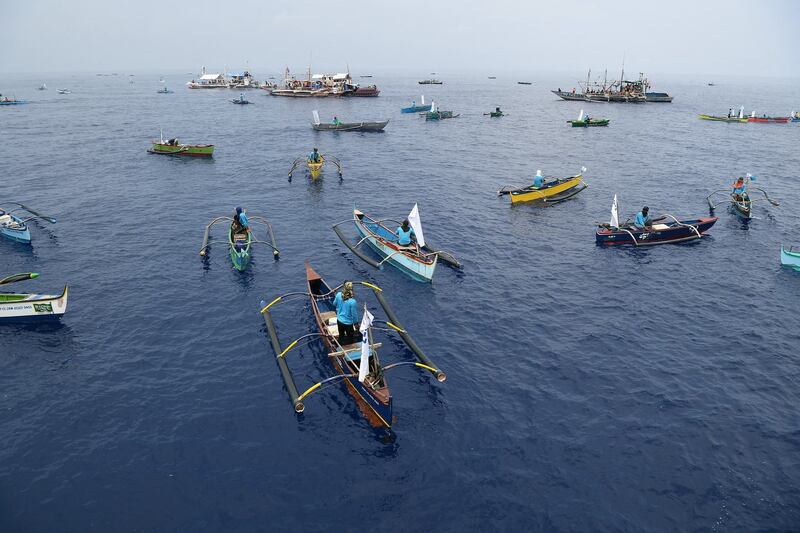The Philippine military on Tuesday vowed it would protect Filipino fishermen during the four-month fishing ban China has imposed in contested South China Sea waters, including in areas within Manila’s exclusive economic zone (EEZ).
Manila had a day earlier summoned China’s envoy to protest the annual moratorium, as it does every year, saying the practice violates its sovereign rights. Beijing claims the ban promotes sustainable fishing and conserves marine ecology in the waterway.
Commodore Ray Vincent Trinidad, a Philippine Navy spokesman, said on Tuesday that the force had deployed additional vessels to protect Filipino fishermen.
“The Philippine Navy does not recognize this provocative statement nor will we be deterred in performing our mandate of securing the welfare of Filipinos wherever he or she is – on land or on sea,” said Trinidad, spokesman for the West Philippine Sea, referring to China’s fishing moratorium.
“Overall, patrols have been increased in the entire [West Philippine Sea].”
Manila calls areas in the South China Sea that are within its exclusive economic zone (EEZ) the West Philippine Sea.

China’s fishing moratorium this year, which began on May 1 and is scheduled to last until Sept. 16, will take place as a new China Coast Guard order is scheduled to go into force June 15.
The Chinese coast guard had on May 15 issued an order authorizing its personnel to detain foreign boats and nationals suspected of trespassing into Beijing-claimed waters in the South China Sea for up to 30 days – and as many as 60, in some cases. Manila has called this order "illegal," warning against repercussions if it is implemented.
Meanwhile, Filipino fishermen said they would continue to fish in the waters that Manila claims despite threats of arrest by Chinese authorities.
“We will not follow this baseless ban by China in our waters,” Joey Marabe, provincial coordinator of the Filipino fishermen’s group Pamalakaya in Zambales, told BenarNews on Tuesday.
He called the ban an “unacceptable insult,” alleging that China had been known for destructive fishing practices.
Marabe said the ban would directly affect the livelihood of Filipino fishermen and vowed they would ignore it.
“No foreigner has the right to stop us from fishing in our own territory,” he said.
China in 2012 seized the Scarborough Shoal, a traditional fishing ground in another part of Manila’s EEZ, after a two-month standoff with the Philippine Navy.
Manila subsequently took China to an international arbitral court, and in 2016 won a landmark ruling in the Permanent Court of Arbitration in The Hague, which threw out China’s expansive claims in the South China Sea.
Beijing, however, has ignored the ruling and refuses to leave Scarborough Shoal, which Manila calls Bajo de Masinloc. Recently, the China Coast Guard shadowed a Filipino civilian mission to Scarborough, though there was no major incident.
‘Constructive multilateralism’
On Monday, Manila filed its 25th diplomatic protest against China this year, and the 158th since President Ferdinand Marcos Jr. was elected in 2022.
The “unilateral imposition of the fishing moratorium raises tensions in the West Philippine Sea and the South China Sea,” Manila’s Department of Foreign Affairs said in a statement after summoning the Chinese envoy.
“Through a diplomatic note, the Philippines protested the ban insofar as it includes the [Philippines’] maritime zones over which the Philippines has sovereignty, sovereign rights, and jurisdiction.”
The statement added that the ban had undermined an understanding between Marcos and Chinese leader Xi Jinping that both countries would “manage differences through diplomacy and dialogue,” and reduce tensions at sea.
China’s embassy in Manila did not immediately respond to a BenarNews request for comment.
Manila’s protest came days before Marcos is expected to discuss the South China Sea dispute in his keynote speech at an international security forum in Singapore.
Top political and security leaders from dozens of countries are most likely to attend the Shangri-La Dialogue this weekend. The annual inter-governmental security forum is organized by the Singaporean think-tank International Institute for Strategic Studies.
“I think it is extremely timely that I attend [the Shangri-La Dialogue] and put forward and articulate the Philippines’ perspectives and outlook on defense and diplomacy while we continue to highlight the Philippines’ commitment to a rules-based international order and constructive multilateralism amidst the current geopolitical challenges that we face in our region,” Marcos said on Tuesday, before he departed for a state visit to Brunei en route to Singapore.
BenarNews is an RFA-affiliated online news organization.
